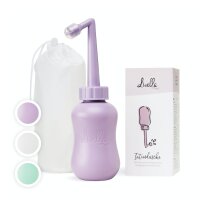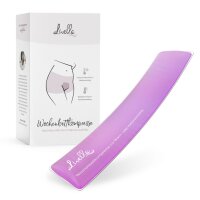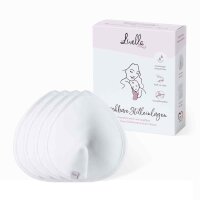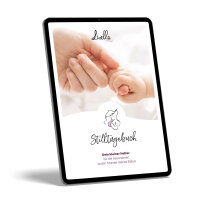Many breastfeeding mums are worried about returning to work after maternity leave. After all, going back to working full-time after having been in full-on mum mode for several months is a big change. Also, the return to work poses challenges for mothers who want to continue breastfeeding their little one.
Quite a few mums wonder whether breastfeeding and going back to work are compatible. The good news is that returning to work after maternity leave doesn't mean that you have to stop breastfeeding. Breastfeeding mums enjoy various rights that are designed to make breastfeeding at work possible.
But exactly are those rights? What is the law on breastfeeding at work in the UK? What are the rules regarding breastfeeding breaks, working hours and more? And are you allowed to breastfeed at work? Read on as we answer all your questions.
Table of content
Breastfeeding at work: laws and rights in the UK
Breastfeeding at work: what are the main challenges?
Breastfeeding at work: the best tips for mums
Breastfeeding at work laws: frequently asked questions
Breastfeeding at work: laws and rights in the UK
The most important thing breastfeeding mums should know is that there is no need to stop breastfeeding just because it’s time to go back to work. The law in the UK might not grant new mums as many rights as in other countries, but mothers of newborn children still enjoy legal protection. So, what is the law on breastfeeding at work?
Under UK law, employers are legally obligated to carry out a health and safety assessment before the new mother returns to work. Any work that could expose the employee to organic mercury, radioactive material or lead is unsuitable for a woman who is breastfeeding.
Additionally, there are other obligations employers have to fulfil regarding breastfeeding employees. Here are the breastfeeding rights at work in the UK at a glance.
- Similar to all other employees, breastfeeding mothers have the right to request flexible working hours.
- New mothers cannot be made redundant just because they have been on maternity leave or ask for flexible working hours.
- Employers need to provide a suitable space for new mothers to rest at work. Ideally, this should be a clean and private room that is also suitable for expressing and storing breast milk (or breastfeeding if this can be arranged).
- It is illegal for employers to treat a female employee unfairly because she is breastfeeding.
- Employers further need to ensure that employees who are breastfeeding are protected from harassment.
You should know that employers are not obligated to give you additional break times for breastfeeding at work.

Breastfeeding at work: what are the main challenges?
Combining breastfeeding and work comes with different challenges. The main factors that make breastfeeding at work difficult are stress and lack of sleep.
Stress and lack of sleep
Breastfeeding mums can be quite sensitive to stress, which can become a problem when returning to work after maternity leave. Upon their return to work, new mothers usually have a lot of catching up to do and it’s not always possible to avoid stress during the first days back at work.
Stress can have negative repercussions on breastfeeding. For instance, stress can cause tension in your body and make you more irritable. Your baby will sense this and might start crying at the breast or even go on a breastfeeding strike. Also, stress can inhibit your let-down reflex. The same can be said about lack of sleep.
With so much going on at work and at home with your baby, you may find it hard to sleep in the first few days after your return to work. What’s more, babies often struggle sleeping during the first days of separation from their mother.
It’s also common for babies to want to breastfeed a lot at night during this time to make up for the breastfeeding sessions they missed during the day. Since lack of sleep can make you more irritable and short-tempered than usual, this can adversely affect breastfeeding. For instance by inhibiting your milk flow.
Other factors that can make breastfeeding at work more difficult
Other than stress and lack of sleep, it’s mainly the following factors that can make it harder for new mothers to breastfeed their baby after maternity leave is over:
- Your baby’s age: The younger your baby, the more difficult it will be to combine breastfeeding and work. That’s because breastfeeding isn’t as firmly established yet as with older babies.
- Physical distance: Depending on the distance between your place of work and your home or childcare facility, it’s near impossible to go see your baby at lunchtime for a quick breastfeeding session or have someone drop your baby off at your office for an hour.
- Field of work: Not every type of work lends itself to flexible work or working from home. In some jobs, flexible schedules simply aren’t possible because they would cause disruptions in workflows and lead to problems further down the line.
Breastfeeding at work: the best tips for mums
Returning to work and keeping up breastfeeding is a challenge. But don’t let this discourage you. Here are a few tips that will help you successfully combine breastfeeding and work.
- Let your employer know: Informing your employer that you are breastfeeding can remove many obstacles on the way to successful breastfeeding at work. Let your employer know in due time that you intend to continue breastfeeding after maternity leave and explain what you need for it.
- Find a childcare facility close to work: There is no legal obligation for employers in the UK to provide breastfeeding breaks. Therefore, the only way you’ll be able to breastfeed your baby during working hours is to find a childcare facility close to your place of work. This way, you can quickly head over to the childcare facility during your lunch break and have a breastfeeding session with your little one.
- Work from home if possible: Depending on your job, it may be possible for you to work from home after maternity leave. When you’re at home with your baby, you’re more flexible when it comes to breastfeeding at work.
- Pay attention to your diet: Eating a healthy breastfeeding diet is especially important for working mothers. Working full-time, pumping breast milk, and caring for your newborn after work is a lot for your body to handle. So, make sure to take good care of yourself by eating well.
- Request flexible working hours: Under UK employment law, all employees are entitled to ask for flexible work. This includes breastfeeding mothers. Although there is no legal right to paid breastfeeding breaks, you might be able to arrange flexible working hours that allow you to integrate additional (unpaid) breaks into your schedule that allow you to breastfeed your baby in between.
- Use nursing pads: It’s not uncommon for breastfeeding mums to leak breast milk. When at work, breast milk leakage can cause stains on your work shirt, which can be quite embarrassing. An easy way to prevent this is to use nursing pads that absorb leaking breast milk. Ideally, you have several pairs of washable nursing pads so that you can change them while at work.
- Express and label breast milk: Since your employer is not obligated to give you additional time off for breastfeeding at work, the most convenient way is to express and bottle your breast milk so that your childminder can feed it to your baby while you’re at work. You should also make sure to label and date the bottles so that it’s clear which ones should be used first.

Breastfeeding at work laws: frequently asked questions
There are many uncertainties out there when it comes to breastfeeding at work. We answer the most frequently asked questions.
How do I breastfeed my baby while working?
The easiest way to combine breastfeeding and work is to express breast milk and have your childminder, partner, relative or whoever looks after your baby in your absence feed the milk to your little one. Labelling and dating the bottles helps make sure that the milk you express gets used quickly.
Actually breastfeeding at work can be challenging because employers are not legally obligated to provide suitable facilities for breastfeeding. If you manage to find a childcare facility near your place of work, you could also visit your baby at lunchtime and breastfeed in the facility.
Another option is to have your partner or a relative bring your baby to your place of work so that you can breastfeed your little one during your lunch break or any other break that might be integrated into your work schedule. Making arrangements for flexible working hours also makes things a lot easier when it comes to breastfeeding at work.
How long can you breastfeed at work?
It’s up to the mother to decide how long she wants to continue breastfeeding her child. Given that there is no legal obligation for employers to provide breastfeeding breaks, there is no time limit on breastfeeding at work. And since all employees have the right to request flexible working hours, there are no restrictions from this end either.
What are my rights as a breastfeeding mother at work?
Breastfeeding mothers enjoy several rights at work. These include:
- Protection from discrimination and harassment linked to the fact that they are breastfeeding
- Right to be given a suitable place to rest at work which should also be suitable for expressing and storing breast milk or for actually breastfeeding at work
- Right to request flexible working hours
- Protection from being made redundant due to having been on maternity leave or requesting flexible working hours
What are the rules for breastfeeding at work?
The main thing to remember is that there is no legal entitlement to breastfeeding breaks in the UK. The only real obligations for employers are to carry out a health and safety assessment for employees who are breastfeeding and to provide a clean and private facility where the new mother can rest and express milk.
Other than that, it’s up to the employer to make any further arrangements to accommodate the breastfeeding mother’s needs in the workplace. This includes deciding if flexible working hours are compatible with the position she holds.
References
- Breastfeeding and going back to work - NHS (www.nhs.uk)
- Breastfeeding and returning to work | Life as a parent, Work and childcare articles & support | NCT
- Returning to work - Maternity leave and pay - Acas
- Asking for flexible working - Making a flexible working request - Acas
- Protecting pregnant workers and new mothers - Rest and breastfeeding at work (hse.gov.uk)
- Protecting pregnant workers and new mothers - Risk assessment (hse.gov.uk)
- Continuing to breastfeed when you return to work - Maternity Action
















